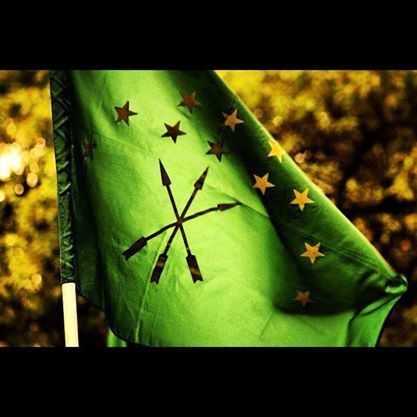
Moscow’s Efforts to Erase Circassian History Are Backfiring
Publication: Eurasia Daily Monitor Volume: 14 Issue: 66
By:

Like the tsarist authorities who expelled the Circassians from the North Caucasus in 1864, an action many refer to as an “act of genocide,” and the Soviet ones who divided that nation up into a series of smaller ethnic communities, including the Adygei, the Kabardin, the Cherkessk and the Shapsugs, the Russian government of Vladimir Putin is devoting ever greater efforts to erasing the Circassians from the pages of history. The Kremlin’s goal appears to be to prevent the once largest Muslim nationality in the North Caucasus from recovering its sense of unity and from challenging Moscow’s control of that region.
In an article entitled “Forget about the Circassians: They No Longer Exist,” Circassian activist Anzor Daur discusses just how far this process has gone since Putin became president. While some post-Soviet Russian officials earlier acknowledged that the area Russians call the Kuban was once populated by and ruled over by Circassians, today they, in lock step, refuse to even concede that fact as tensions with Kyiv have heated up over whether that region should belong to Russia or Ukraine (On Kavkaz, May 16; Windowoneurasia2.blogspot.com, May 14).
But Moscow’s effort to rewrite history in this case is having exactly the opposite effect the Kremlin intends. It has provoked Circassians both in the North Caucasus and abroad to focus on Moscow’s methods and to mobilize to oppose them by speaking out and demanding that their history be recognized and their holidays celebrated. This past Sunday (May 14), for example, the Maikop city organization Adyge Khase–Circassian Council issued a declaration pointing out that neither Ukraine nor Russia should be talking about the Kuban as if it had always belonged to one or the other. In fact, the Council pointed out, it was Circassian before the Russians killed or expelled most of their ancestors (Kavkazr.com, May 15).
“One should not try to divide the skin of a living ‘bear,’ ” the Council continued. It declared that the Kuban and many other parts of Circassia were emptied of their population “as a result of the genocide of the indigenous population, a genocide already partially recognized, including by the Kabardino-Balkar Republic and the Adygei Republic, which are part of the Russian Federation, as well as by Georgia and the Unrecognized Peoples Organization.” It called on Russian officials to end “the falsification of the history of the Kuban, to order the removal of monuments to tsarist generals of the Russian-Caucasus war,” and “to not forget about the rights and interests of the Circassians.”
Avraam Shmulyevich, an Israeli specialist on the Caucasus, points out that “the Zaporozhian Ukrainians and the Circassians have become victims of Moscow’s policies.” They are in fact “brothers connected by a common origin,” and now Ukraine should “support both the return of Circassian lands to their lawful owners and also the construction of a democratic Circassia in which all residents will have equal rights,” both Circassians and “the descendants of Ukrainians” who were expelled from there. The latter, he says, should be allowed to “freely return” to this restored state where they will be able to “develop Ukrainian Cossack culture” (Kavkazr.com, May 15).
But Moscow shows little sign that it might be willing to meet the Circassians even part way. Instead, Russian officials have been doing what they can to interfere with all efforts by Circassians to recall their history and restore their national unity, an effort that is particularly worrisome in the lead-up to May 21, when Circassians around the world—the more than 500,000 still in the North Caucasus homeland and the more than five million abroad—will mark the 153rd anniversary of the Russian expulsion of their nation to the Ottoman Empire.
What Moscow is likely to do later this week is suggested by what it did on April 25, when officials in Kabardino-Balkaria interfered with the celebration of the Day of the Circassian National Flag. According to one participant in that celebration, “the powers that be react to such measures with caution […] trying not to show this openly,” because the Circassians are recovering their pride and unity and the Russian officials are afraid of triggering clashes that could make Moscow’s position in the North Caucasus even worse (Kavkazr.com, May 5).
In the Adygei Republic, Circassian activist Asker Sokht noted, the authorities have been more restrained. But in Krasnodar krai, where many Circassians live, officials have adopted a new approach, insisting that any commemoration of Circassian events take place indoors rather than in public. Such a directive limits the size of the meetings, restricts attendance by young people, and makes it easier for the authorities to control the situation (Kavkazr.com, May 5).
Aida Gerg, a Circassian from Kabardino-Balkaria, pointed out that Circassians have little choice but to agree to the conditions the local governments set. But she emphasized that the authorities are far from united. Some are quite sympathetic to the Circassians, while most are totally opposed and would enthusiastically engage in more repression if and when Moscow calls for that.
In making plans for future demonstrations, including the May 21 Memorial Day for Victims of the Caucasus War, she said, Circassians will not give the authorities any opening for launching such a policy. Instead, they will work to ensure that a large number of young people take part, something that past events suggest will make officials more cautious in response.



